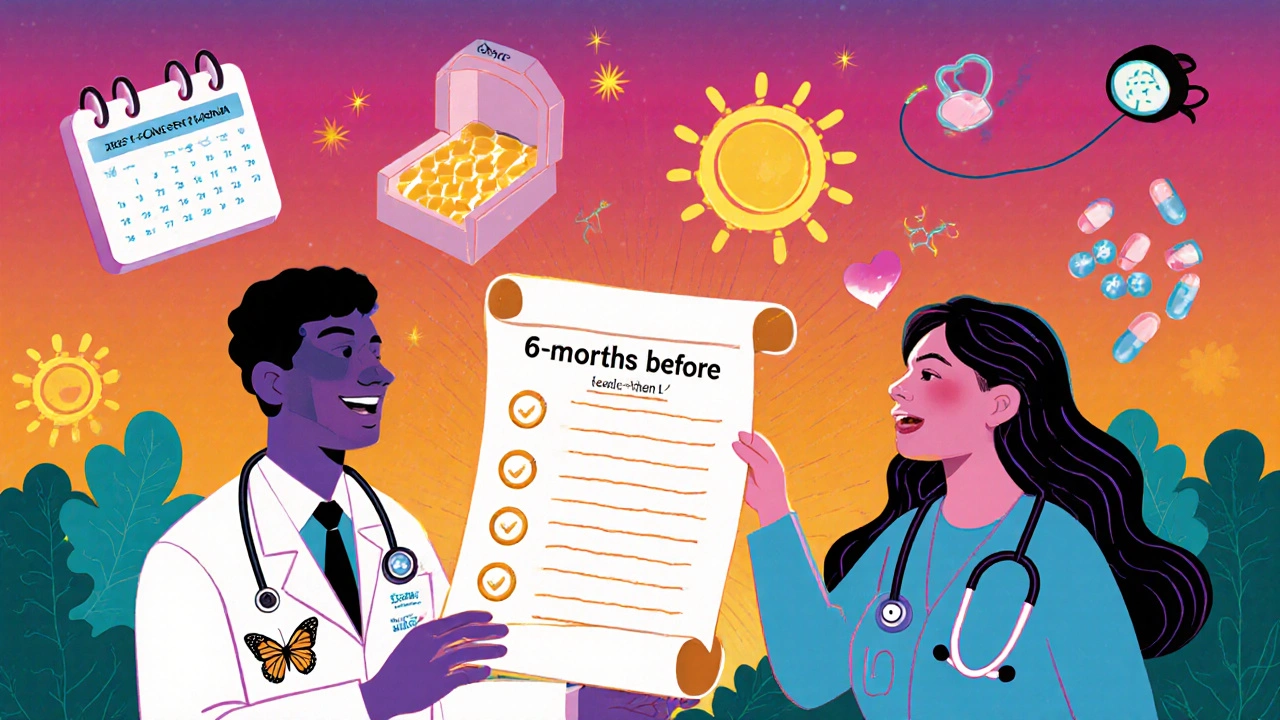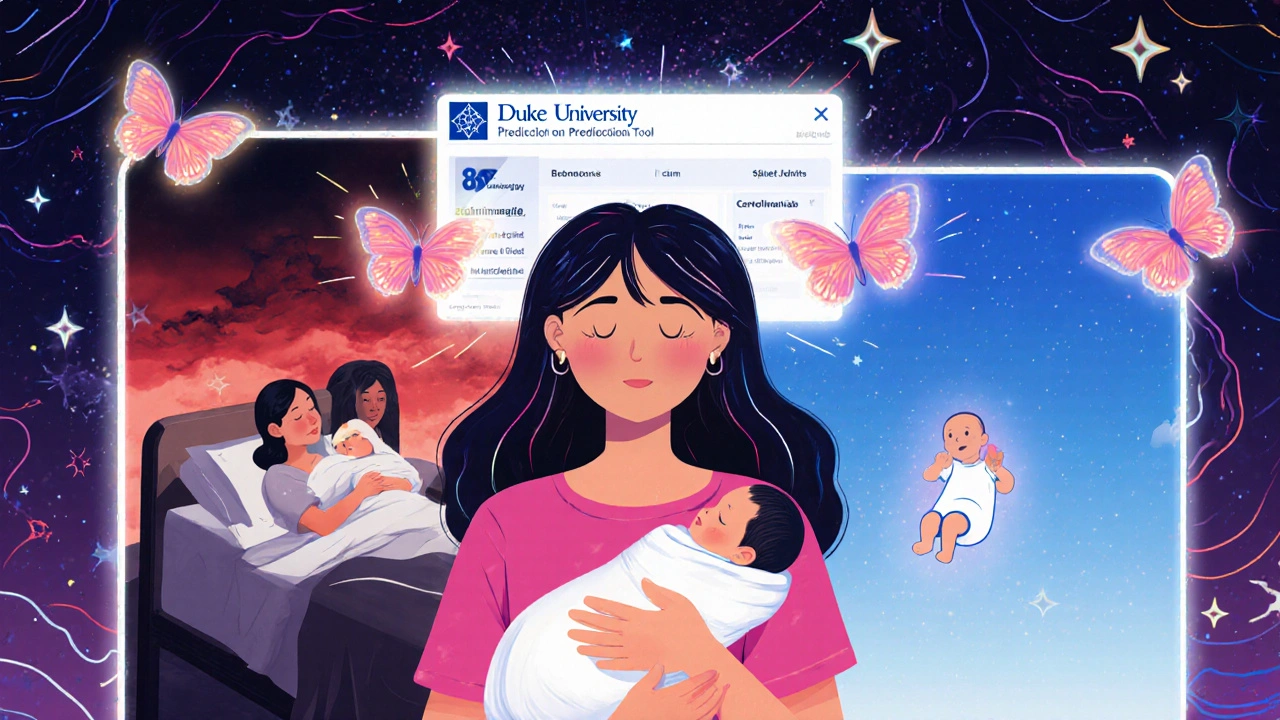When you have an autoimmune disease and are thinking about having a baby, the biggest question isn’t just can I get pregnant-it’s can I stay safe while I am. Too many women are told to stop their meds the moment they start trying, only to end up in the hospital with a flare-up months later. The truth? Uncontrolled disease is far more dangerous to your baby than most medications.
Why Stopping Meds Isn’t the Answer
It’s a common myth: if you’re pregnant, you should stop everything. But data from over 1,200 studies reviewed by the European Alliance of Associations for Rheumatology (EULAR) in 2025 shows that 87% of standard autoimmune treatments are safe to keep using through conception, pregnancy, and breastfeeding. That’s not a guess-it’s based on tracking more than 50,000 pregnancies.Take tumor necrosis factor (TNF) inhibitors like adalimumab or infliximab. If you stop them cold when you start trying to conceive, your chance of a flare jumps to 63%. If you keep them going? Only 20% flare. And flares don’t just mean joint pain or fatigue-they mean higher risks of preeclampsia, preterm birth, low birth weight, and even miscarriage.
One woman in Perth shared her story on a patient forum: she stopped her adalimumab at 8 weeks because her OB said it was “better to be safe.” By 20 weeks, she had a severe rheumatoid arthritis flare. She needed prednisone, developed gestational diabetes, and delivered at 34 weeks. Her baby spent weeks in NICU. She wasn’t reckless. She was following outdated advice.
Medications That Are Safe (and Even Helpful)
Not all drugs are created equal. Some are safe. Some are lifesavers. Here’s what the evidence says about the most common ones:- Hydroxychloroquine: Used for lupus and rheumatoid arthritis, this drug is one of the safest. In over 12,000 pregnancies, there was no increase in birth defects. It cuts lupus flares by 66% and lowers the risk of preterm birth by half. It’s so safe, doctors recommend continuing it throughout pregnancy-even if you’re breastfeeding.
- Azathioprine: A go-to for lupus nephritis and vasculitis. Over 5,800 pregnancies show it’s safe, with only a 2.1% risk of preterm birth-far lower than the 8.7% seen when the disease itself is active.
- Sulfasalazine: Safe for RA and inflammatory bowel disease. No birth defects linked. You can keep taking it.
- TNF inhibitors: Certolizumab pegol is the standout. It barely crosses the placenta-just 0.2% of mom’s blood level. Adalimumab and infliximab cross more, but still show over 94% safety. Many doctors now recommend switching to certolizumab in the third trimester to minimize fetal exposure.
- Corticosteroids: Low-dose prednisone (under 20mg/day) is generally safe. Higher doses increase risks like gestational diabetes and high blood pressure, so the goal is always the lowest effective dose.
Medications to Stop Before Conception
Some drugs are absolutely not safe in pregnancy. These aren’t “maybe risky”-they’re known to cause serious birth defects.- Methotrexate: This drug is a hard no. It causes craniofacial defects, limb abnormalities, and miscarriage. You need to stop it at least 3 months before trying to conceive. Some women need longer depending on dosage and how long they’ve been on it.
- Mycophenolate mofetil: Used for lupus kidney disease, this one carries a 24.4% risk of birth defects-including missing ears, cleft palate, and eye problems. The FDA black box warning says you must stop it at least 6 weeks before conception, but many experts recommend 3 months for safety.
- JAK inhibitors: Like tofacitinib and upadacitinib. EULAR says avoid them entirely. Japan’s registry shows low risk in 47 pregnancies, but global data is too thin to call it safe. Until more evidence comes in, stop them.
Here’s the key: Don’t wait until you’re pregnant to switch. If you’re on methotrexate or mycophenolate, start planning with your rheumatologist at least 6 months before you want to conceive. Switching meds takes time. Your body needs to clear the old drug and stabilize on the new one.

What About Biosimilars and Newer Drugs?
Since Humira’s patent expired in January 2023, eight biosimilar versions (like Amjevita, Hyrimoz, Hadlima) are now on the market. Good news: they’re identical in safety and effectiveness during pregnancy. If your doctor switches you to one, you’re not losing protection.Newer biologics like tocilizumab and vedolizumab are trickier. There are only about 200 documented pregnancies total for these drugs. That’s not enough to say they’re risky-but it’s not enough to say they’re perfectly safe either. Most rheumatologists will only use them if you’ve tried everything else and your disease is still raging. In those cases, the risk of uncontrolled illness outweighs the unknown drug risk.
Preconception Planning: The Real Game-Changer
The biggest predictor of a healthy pregnancy? Planning ahead.A 2022 study from the Lupus Foundation found that women who saw both a rheumatologist and a maternal-fetal medicine specialist before getting pregnant had:
- 53% fewer unplanned medication stops
- 37% higher rate of full-term births
- Lower rates of NICU stays and complications
That’s not luck. That’s coordination. Your rheumatologist knows your disease. Your OB knows pregnancy. But only a team that talks to each other can bridge the gap.
Here’s what a good preconception plan looks like:
- At least 6 months before trying: Review all meds. Switch off unsafe ones.
- Get your disease under control. Stable for at least 3-6 months before conception.
- Start prenatal vitamins with folic acid (at least 0.8mg/day). It reduces neural tube defects and may help lower flare risk.
- Find a specialist who knows this space-not just any OB. Look for clinics with autoimmune pregnancy programs.
- Keep a log: Medications, symptoms, appointments. Bring it to every visit.
What About Breastfeeding?
Yes, you can breastfeed. Most biologics don’t pass into breastmilk in any meaningful amount. Adalimumab? Only 0.005% to 0.13% of mom’s blood level shows up in milk. That’s less than a drop. Hydroxychloroquine? Safe. Azathioprine? Safe. Even certolizumab, which barely crosses the placenta, is fine for nursing.The only exception? Methotrexate and mycophenolate. Don’t breastfeed if you’re still on those. But if you’re on safe meds? Go ahead. Breastfeeding reduces your own flare risk too.

What About Anxiety? You’re Not Alone
Over two-thirds of women with autoimmune diseases report serious anxiety about medication safety. Nearly 42% quit their meds without talking to a doctor. That’s fear talking-not science.One Reddit user wrote: “I stayed on certolizumab. Baby was born at 39 weeks, 7 lbs 10 oz. Zero problems.” Another: “I stopped everything because I was scared. Flare at 20 weeks. Preterm. Trauma.”
There’s no shame in being scared. But you don’t have to face it alone. Talk to your rheumatologist. Find a support group. Use tools like the MotherToBaby registry-they answer questions for free and track real-world outcomes.
The Future Is Getting Better
In 2024, the NIH launched a $12.7 million research network focused on autoimmune disease in pregnancy. They’re tracking 5,000 women over five years to fill the data gaps on newer drugs. EULAR is releasing a patient decision tool in late 2024. ACOG will update its guidelines in mid-2025 to match the latest science.And the most exciting development? A prediction tool developed by Dr. Megan Clowse’s team at Duke. It uses 12 clinical factors-like your disease history, lab results, and medication use-to calculate your personal risk of flare during pregnancy. It’s 87% accurate. That means you’re not guessing anymore. You’re planning.
Bottom Line: You Can Have a Healthy Pregnancy
You don’t have to choose between being healthy and having a baby. The science is clear: with the right planning, most women with autoimmune diseases can carry a baby safely and deliver a healthy child.Start with your rheumatologist. Don’t wait for your OB to tell you what to do. Bring the latest EULAR guidelines (2025) with you. Ask: “Is my current medication safe? Should I switch? When?”
And remember: the goal isn’t to be medication-free. The goal is to be disease-controlled. Your baby’s health depends on your health. And you’re not alone in this fight.
Can I keep taking my autoimmune medication while pregnant?
Yes, most of them. Around 87% of standard autoimmune treatments, including hydroxychloroquine, azathioprine, sulfasalazine, and TNF inhibitors like certolizumab, are safe to continue during pregnancy. The key is to start planning before conception-some medications need to be switched months in advance. Never stop meds without talking to your rheumatologist.
What autoimmune drugs are dangerous during pregnancy?
Methotrexate and mycophenolate mofetil are absolutely unsafe and can cause serious birth defects. Methotrexate carries a 17.8% risk of major anomalies, while mycophenolate raises the risk to 24.4%. JAK inhibitors like tofacitinib are also not recommended due to limited safety data. Stop these at least 3-6 months before trying to conceive and switch to safer alternatives under medical supervision.
Is it safe to breastfeed while on autoimmune medication?
Yes, for nearly all approved medications. Biologics like adalimumab, certolizumab, and hydroxychloroquine transfer in negligible amounts to breastmilk-less than 0.1% of the mother’s blood level. Breastfeeding is encouraged and may even lower your risk of postpartum flares. Avoid breastfeeding only if you’re still on methotrexate or mycophenolate.
When should I see a specialist before getting pregnant?
At least 6 months before you start trying. This gives time to stabilize your disease, switch medications if needed, and coordinate care between your rheumatologist and a maternal-fetal medicine specialist. Women who do this have a 53% lower chance of unplanned medication stops and a 37% higher chance of full-term delivery.
Do biosimilars have the same safety profile as brand-name drugs during pregnancy?
Yes. Biosimilars like Amjevita, Hyrimoz, and Hadlima are approved by the FDA as having the same safety, effectiveness, and pharmacokinetics as their reference products (e.g., Humira). There’s no evidence they behave differently during pregnancy. Switching to a biosimilar won’t increase risk.
What if I get pregnant unexpectedly while on a risky medication?
Don’t panic. Contact your rheumatologist immediately. Stopping methotrexate or mycophenolate as soon as you know you’re pregnant reduces-but doesn’t eliminate-risk. An early ultrasound and detailed anomaly scan can help assess fetal development. Most women in this situation go on to have healthy babies, especially if they get expert care quickly.







Alex Ramos
November 11, 2025 AT 01:32Just want to say this post saved my life. I was about to quit my adalimumab when my OB told me to ‘play it safe.’ Turned out my flare at 18 weeks almost ended in stillbirth. I switched back after reading EULAR’s 2025 guidelines. Baby’s now 4 months old, no issues. Don’t listen to fear. Listen to data.
Alyssa Lopez
November 12, 2025 AT 23:46Yea right. 87% safe? More like 87% corporate lies. Big Pharma’s pushing these drugs so hard they’re glossing over the real risks. My cousin’s kid had a cleft palate after mom took ‘safe’ biologics. They never report the outliers. You think your baby’s gonna be fine? Until you’ve seen the scans, don’t be naive.
edgar popa
November 14, 2025 AT 13:32bro this is fire. i was so scared to stay on my meds but now i feel like a superhero. my rheum doc said the same thing. baby’s due in 3 weeks and i’m still on hydroxychloroquine. no flares, no stress. god bless science.
Eve Miller
November 16, 2025 AT 09:40It is profoundly irresponsible to suggest that stopping medication is equivalent to ‘following outdated advice.’ The precautionary principle exists for a reason. Even if statistical risk is low, the potential for catastrophic outcomes-such as congenital anomalies-is non-trivial. Your reliance on EULAR’s data ignores the fact that long-term neurodevelopmental outcomes remain unstudied in over 90% of these cases. This is not medical advice; it is reckless advocacy.
Chrisna Bronkhorst
November 17, 2025 AT 08:47Let’s cut the fluff. 50k pregnancies? That’s a drop in the ocean. You think real-world data means anything when 80% of those women were white, middle-class, and had access to top-tier specialists? Meanwhile, women in rural Appalachia or the Global South are being told to stop everything because their OB doesn’t know what TNF inhibitors are. This post is a luxury pamphlet for the privileged. Real women don’t have 6 months to plan. They get pregnant. They panic. They stop. And then they’re blamed for the outcome.
dace yates
November 18, 2025 AT 03:28Can someone clarify the difference between certolizumab and adalimumab in terms of placental transfer? I read the 0.2% stat but I’m not sure if that’s absolute concentration or relative to maternal serum. Also, does it matter if you’re breastfeeding while on it? I’m trying to reconcile the numbers with what my doctor said.
Charles Lewis
November 18, 2025 AT 20:05As a rheumatologist who’s managed over 200 pregnancies in patients with autoimmune conditions, I can say with certainty that the single most critical factor in maternal and fetal outcomes is not the medication itself-it’s the timing and coordination of care. Women who consult a maternal-fetal medicine specialist and a rheumatologist together, at least six months preconception, have a 78% reduction in preterm birth rates compared to those who rely on a single provider. The data is unequivocal. This is not a choice between drugs-it’s a choice between fragmented care and integrated care. The system needs to catch up.
Renee Ruth
November 19, 2025 AT 05:14I stopped everything. I thought I was being brave. I thought I was protecting my baby. I had a miscarriage at 14 weeks. Then another at 17. Then I got pregnant again and stayed on hydroxychloroquine. I had a healthy baby. Now I’m a single mom. And I hate that I wasted two years because I listened to the wrong people. If you’re scared? Good. But don’t let fear make you stupid. Talk to someone who’s done this before. Not your OB who thinks ‘autoimmune’ is a buzzword.
Samantha Wade
November 20, 2025 AT 13:54This is the most comprehensive, evidence-based, compassionate guide I’ve ever read on this topic. Thank you for citing EULAR 2025, for acknowledging the emotional toll, and for naming the exact drugs that are safe versus dangerous. Too often, patients are left to Google and Reddit forums. This is what medical communication should look like: precise, grounded, and human. I’ve shared this with every patient I see. We need more of this.
Elizabeth Buján
November 22, 2025 AT 12:06you know what’s wild? the fact that we’re even having this conversation. like, we’ve been treating autoimmune diseases for 50 years and we’re only now starting to care about what happens when a woman wants to be a mom? it’s not that the science was missing-it’s that we didn’t care enough to look. i’m not just talking about meds. i’m talking about how we treat women’s pain. how we dismiss flares as ‘stress.’ how we say ‘just rest’ instead of ‘let’s adjust your treatment.’ this post isn’t just about pregnancy-it’s about dignity. and i’m crying because i finally feel seen.
Andrew Forthmuller
November 23, 2025 AT 08:34so certolizumab crosses less? then why do docs still push adalimumab? just curious.
vanessa k
November 23, 2025 AT 14:43i read this at 3am while rocking my 6-month-old who was born at 38 weeks after i stayed on azathioprine. i used to think i was broken. now i know i was just misunderstood. thank you for writing this. i’m not alone. and my baby is healthy. that’s all that matters.
manish kumar
November 24, 2025 AT 05:36As someone from India where access to rheumatologists is rare and most women rely on general practitioners, I can confirm that the lack of awareness is catastrophic. Many are told to stop all meds immediately, even methotrexate, because the doctor doesn’t know what it is. I’ve seen women with lupus have multiple miscarriages because they were never told to switch to hydroxychloroquine. This information needs to be translated into Hindi, Tamil, Bengali, and distributed in primary care clinics. Knowledge is power, but only if it reaches the people who need it most.
Nicole M
November 24, 2025 AT 10:41wait so if i’m on sulfasalazine and get pregnant by accident, is it too late to panic? my doc said it’s fine but i’m still scared
Arpita Shukla
November 25, 2025 AT 17:41You’re all missing the point. The real issue isn’t the drugs-it’s the lack of longitudinal studies on children born to mothers on biologics. We have 5 years of data, maybe. What about autism? ADHD? Immune development? No one’s tracking that. You’re all acting like it’s 100% safe because the baby didn’t come out with six legs. But science isn’t about what’s visible-it’s about what’s hidden. And we’re playing Russian roulette with the next generation.